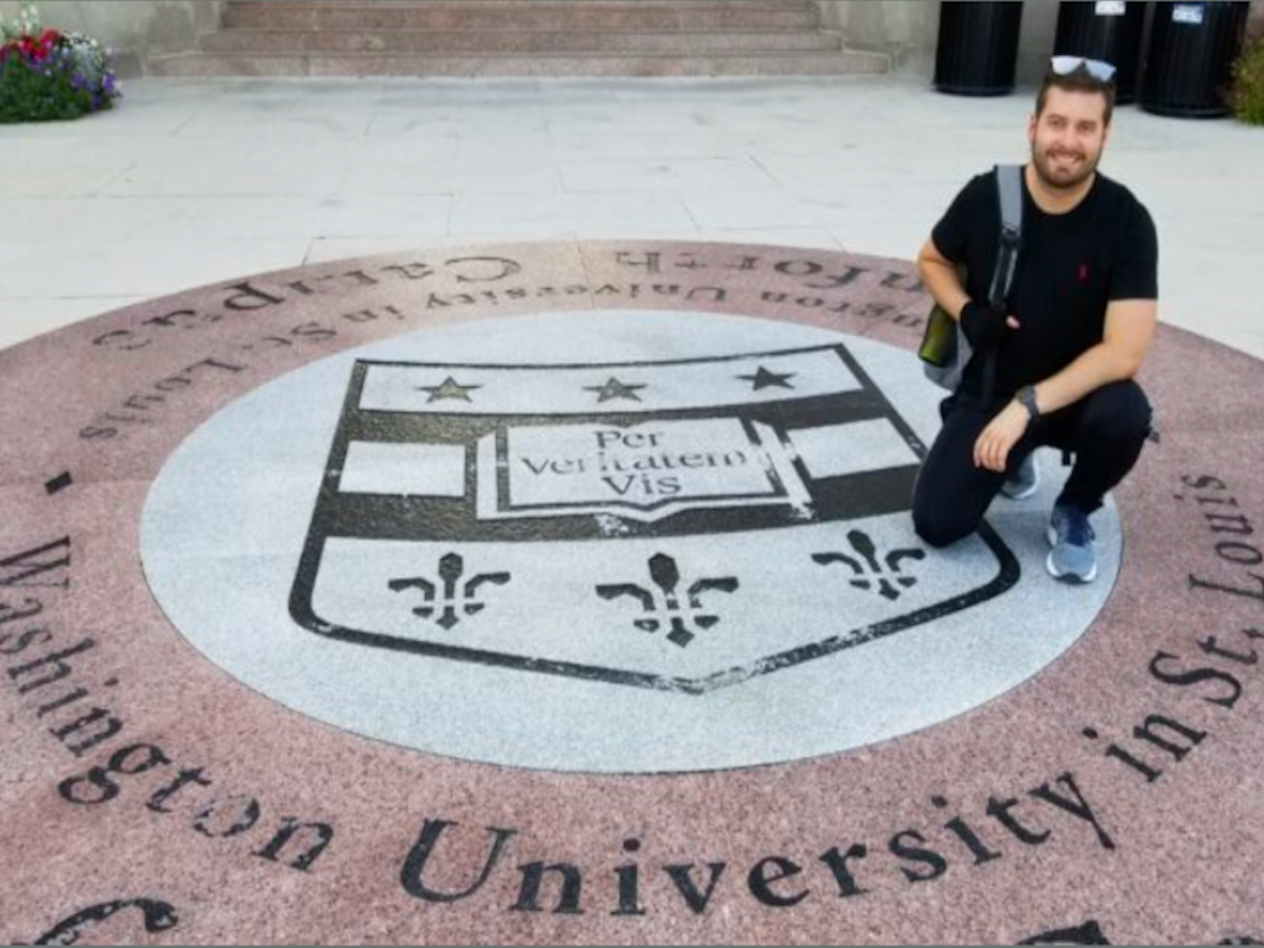MBA student wants to help entrepreneurs become self-sufficient
- April 22, 2021
- By Guest Author
- 6 minute read

The following post originally appeared on The Consortium website and was reposted with permission.
As a burn survivor, Antonio Rivera-Martinez learned the hard way the importance of slowing down, of taking life day by day as opposed to rushing.
Now a first-year MBA student and Consortium fellow at Olin Business School at Washington University in St. Louis, Rivera-Martinez is finding success applying this same mindset to his studies and career.
“As MBA students and as professionals, sometimes, we get really focused on ‘I just want to graduate, I just want to get through midterms, I just want to get a job,’ and sometimes, it’s more about what you need to do in the next hour or the next day,” he says. “Going through the burn injury recovery process really helped me to be patient with myself and everyone around me, and be more conscious. I just focused on doing what I needed to do in the next minute to be sure that I could become the person I wanted to become the next day or the next week.”
With a passion for helping entrepreneurs and small business owners, Rivera-Martinez hopes to use his MBA and the lessons he’s learned to empower people and businesses by connecting them “with the resources they need to succeed and make the world a better place,” he says — “an economic-type diplomat, in a sense.”
A moral imperative
Raised in Puerto Rico, surrounded by family, Rivera-Martinez became interested in community development as a result of his participation in humanitarian and economic development missions across Puerto Rico and other Latin American countries, as well as in Model UN. These experiences influenced his decision to enter the field of economic development and international relations, and it’s how, following high school, Rivera-Martinez ended up at American University studying economics and international studies. “I was very much convinced that I wanted to be in public service, particularly economic development,” says Rivera-Martinez.
Internships in the U.S. Department of State and the Organization of American States, however, steered him in a new direction. There, he learned about the challenges faced by entrepreneurs in disadvantaged communities and potential policies to overcome these.
“I noticed how both the U.S. and Mexican economies, most economies really, are driven by small and medium-size businesses,” Rivera-Martinez says. “A lot of them, if not most of them, are being led by underrepresented communities — Blacks and Latinos — and you really see a disproportionate amount of financial resources that are available to one demographic versus the other.”
Eager to translate this new interest into working with entrepreneurs on the ground but about to graduate with a degree in international studies, Rivera-Martinez applied for and received a Fulbright scholarship to work in Mexico City. “I wanted to understand really well the process of how to build a small business and what the barriers are that are limiting communities from becoming more economically self-sufficient,” he says.
In 2015, after a year of working as an investment operations associate at Cambridge Associates — where he says he “got a crash course in everything related to investing, finance and business” — Rivera-Martinez moved to Mexico City as a Fulbright Binational Business Scholar. Working as a senior analyst and strategy director at Angel Ventures, he learned all about the startup ecosystem, including how venture funding is processed, how entrepreneurs craft their pitches, how they secure funding and what financial institutions are looking for in entrepreneurs. “I was slowly but surely learning all the informational symmetries to connect the dots,” Rivera-Martinez says.
Following completion of the Fulbright program, he was offered a full-time position as a strategy director at Angel Ventures. The opportunity allowed him to travel throughout remote areas of Mexico, where he talked about entrepreneurship with locals as well as worked with government entities, small business incubators and universities. Through the experience, Rivera-Martinez learned that no matter where you are, the same development gap exists among entrepreneurs, and although information about securing funding is often presented in a complicated manner, it’s actually very basic. “Being able to understand that and communicate it to other people was very important to me,” he says.
Ready to run with this new knowledge, Rivera-Martinez unfortunately hit a roadblock. An incident at a bonfire left him with second- and third-degree burns on 25 percent of his body. With a full recovery projected to take a year, he returned to Puerto Rico to be closer to his family and doctors. “I went from being on a ventilator, to walking with a cane, and back to working while still on treatment within a year’s time,” he says.
During this time, Rivera-Martinez began working at a new seed fund that was just getting off the ground in Puerto Rico with Grupo Guayacán — the first of its kind on the island. But then, in September 2017, Maria hit.
The hurricane wiped out power to his family’s home for four months, complicating his recovery efforts and challenging him in new ways. However, he says, helping family members and friends kept him busy and moving forward amidst the chaos. “I remember thinking, ‘I’ve been through worse. I know we’ll be able to get through this,’” Rivera-Martinez recalls.
The hurricane ultimately shifted the focus of the seed fund where he worked as they heard from local businesses about the hardships they were facing and tried to identify companies impacted by the hurricane that could greatly benefit from their assistance. “After the hurricane, it definitely took on a deeper purpose. Now it wasn’t just about funding companies, it was more about doing my part to help with Puerto Rico’s economic recovery,” says Rivera-Martinez.
He enjoyed his experience at the fund, which included investing in companies in industries ranging from food and beverage to AI and software development, but found himself wanting to do even more. “I was reaching a point where I wanted to do more than just connect companies with the resources they needed,” Rivera-Martinez says. “Ideally, I want to be a resource, help build a company or help a particular organization grow, and invest in companies using my time and connections.”
Lacking the operational knowledge to do this, and with encouragement from his mentor Jorge Negron, he decided to pursue his MBA. “Jorge was a Consortium alum from Michigan Ross, and he always talked to me about The Consortium and how it was a great experience, how it really helped him and gave him a lot of tools to be able to help businesses in Puerto Rico,” says Rivera-Martinez, adding that Negron passed away last year. “He was very inspiring in terms of pushing me to apply through The Consortium. His life work and character continue to move forward today. Jorge really helped me realize I had what it takes.”
The Consortium, Rivera-Martinez says, aligned perfectly with what he had been doing and what he hopes to do following his graduation from Olin. In addition to helping Latino and other underrepresented entrepreneurs overcome the obstacles they face through better access to resources, his plans include returning to Puerto Rico, where he hopes to help spur growth in his own community — not to mention, spread the word about The Consortium.
In addition to helping make their future organizations great, Rivera-Martinez believes he and his Consortium peers also have the moral imperative to do as Negron taught him: “to always inspire others to apply to The Consortium and to be better through their work.”
“Business tools are just a way to help and empower others,” he says, “and I think everyone in The Consortium family knows and lives by that.”
Media inquiries
For assistance with media inquiries and to find faculty experts, please contact Washington University Marketing & Communications.
Monday–Friday, 8:30 to 5 p.m.
Sara Savat
Senior News Director, Business and Social Sciences
